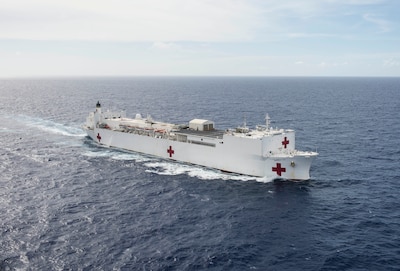By Navy Petty Officer 1st Class Micah Blechner, Logistics
Group Western Pacific
SINGAPORE, Feb. 22, 2018 — PACIFIC OCEAN (Sept. 12, 2016)
USNS Mercy (T-AH 19) steams in the Pacific Ocean after completing Pacific
Partnership 2016 in the Indo-Asia-Pacific region. Mercy is sailing to her
homeport of San Diego.
This annual maritime operation will help improve disaster
response preparedness, resilience and capacity while enhancing partnerships
with participating nations and civilian humanitarian organizations throughout
the Indo-Pacific region, officials said.
Pacific Partnership is the largest annual multilateral
disaster response preparedness mission conducted in the Indo-Pacific region.
This year's mission will be led by Destroyer Squadron 31 and staff embarked on
the hospital ship USNS Mercy and the expeditionary fast transport ship USNS
Fall River, and will include more than 800 military and civilian personnel from
the United States, Canada, the United Kingdom, Australia, France, Peru and
Japan.
Deepening Ties With Regional Partners
"Through Pacific Partnership we are deepening integral
ties with our allies and partners across the Indo-Asia-Pacific region,"
said Navy Rear Adm. Don Gabrielson, commander of Task Force 73, the executive
agent for Pacific Partnership 2018.
"The challenges we face with natural and man-made
disasters do not respect borders or national sovereignty,” Gabrielson added.
“This dynamic mission enables many nations and subject-matter experts to come
together to pursue solutions to complex problems while enhancing preparations
for disaster emergencies that reduce the severity of their impact. The
foundation of trust created through Pacific Partnership engagement helps foster
a cooperative environment that encourages collaborative approaches to improving
the lives and conditions for the people of this region and beyond."
USNS Mercy will make mission stops in Indonesia, Sri Lanka,
Malaysia and Vietnam, while USNS Fall River will visit Yap, Palau, Malaysia and
Thailand. Medical, dental, civil engineering and veterinary teams will partner
with each host nation to conduct civic-action projects, community health
exchanges, medical symposiums and disaster response training activities.
Engagements With Communities
Additional community relations engagements will occur in
each mission stop to enhance relationships and camaraderie with citizens of the
host nations. Following the mission stops, Mercy will also visit Japan during
its return transit across the Pacific Ocean.
Engagements between Pacific Partnership 2018 participants
and host nations are intended to improve capacity, enhance regional
partnerships, and increase multilateral cooperation for preparedness.
“Our staff and team have come together to form a dynamic
team of professionals, and we are ready to execute this mission and engage with
our partners throughout the Indo-Pacific,” said Navy Capt. David Bretz,
commodore of Destroyer Squadron 31. “We are excited about forging new
friendships and deepening partnerships across the region.”
Pacific Partnership began in response to one of the world’s
most catastrophic natural disasters: the December 2004 tsunami that devastated
parts of South and Southeast Asia. The mission has evolved over the years from
emphasis on direct care to an operation focused on enhancing partnerships
through host nation subject matter expert and civil-military exchanges.
Operation’s Distinctions
Pacific Partnership 2018 will have several other
distinctions:
-- A multinational command-and-control structure will be
used to include a deputy mission commander from the United Kingdom and mission
chief of staff from Australia;
-- The mission will visit Sri Lanka for a second consecutive
year to enhance ties with the Indian Ocean nation;
-- Pacific Partnership will continue to leverage the U.S.
National Action Plan on Women, Peace, and Security, a plan backed by Executive
Order 13595 and U.N. Security Council Resolution 1325. Officials said
integration of WPS into Pacific Partnership yields opportunities to engage with
partner nations on the topic of gender integration and perspectives, as well as
preparedness in dealing with vulnerable populations -- women, children, elderly
and disabled -- during and in the aftermath of crises; and
-- This year’s mission will return to Indonesia, Malaysia
and Vietnam, where the United States continues its legacy of strong cooperation
and defense ties with these nations.

No comments:
Post a Comment